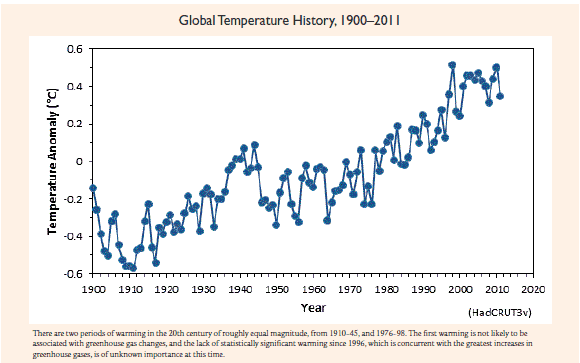Just as President Obama used his inauguration speech to make strong statements about the need to address climate change, a new UN report in progress says that projections about the pace of global warming may need to be ratcheted down.
As we have repeatedly noted, all this is critical, because in the absence of government rules relative to
"cap and trade" or carbon taxes, decisions about carbon reductions programs are left to the free market, and what individual companies and their supply chains think are the best choices relative to reducing costs, gaining customer/consumer favor, or what is just the right thing to do.
With strong government rules, that game is fundamentally changed.
All that said, a draft of a UN climate change report due to be published in 2014 has been leaked, with the major news being that the four temperature models the UN used from 1990 to 2012 have significantly overestimated how much carbon emissions lead to warming.
The report draft was leaked by someone involved in the United Nations Intergovernmental Panel on Climate Change (IPCC) report review process.
"The Earth's mean temperature rose sharply during the 1990s," said Terje Berntsen, a University of Oslo professor who worked on the study. "This may have caused us to overestimate climate sensitivity" to greenhouse gas emissions, meaning the models developed in the 1990s overstate the actual impact.
The IPCC has previously projected that global temperatures may rise about 3 degrees Celsius - with a range of 2 degrees to 4.5 degrees - by 2050 if carbon dioxide levels doubled. However, after applying post-2000 actual temperatures to the models, the Norwegian researchers working for the UN found that rise may be only 1.9 degrees Celsius.
Assuming the projections are correct, the impact of a 1.9-degree rise would be much lower than a 3-degree increase.
Roy Spencer, a climatologist at the University of Alabama at Huntsville, said after the report leak that "Temperatures have not risen nearly as much as almost all of the climate models predicted. Their predictions have largely failed, four times in a row... what that means is that it's time for them to re-evaluate. It is evidence that CO2 is not nearly as strong a climate driver as the IPCC has been assuming."
However, Eystein Jansen, research director at the Bjerknes Centre for Climate Research, told New York Times that "it is way too early to say that this study has any more weight than other studies with low or higher sensitivity. My bet still goes along the 3-degree line as the most plausible, all things considered."
On the other side, "It's appropriate to jump off a ship when it begins to take on water," said Patrick Michael, director of the Center for the Study of Science at the Cato Institute, upon news of the UN revision. "If you look at the monthly temperature anomalies from the University of East Anglia you see no significant trend in any direction going back to the fall of 1996, which would put us at 17 years of no [change in temperature] trend."
Global Temperatures Have Seen Two Periods of Sharp Rise in Last Century
(1910-1945 and 1976-1998) but been Flat in Other Periods

Source: Cato Institute
But counters Aaron Huertas, of the Union of Concerned Scientists "It's important to keep in mind that there are natural short-term variations in global temperature that happen right alongside human-induced warming."
What we will be most interested in is to see is if pressure from environmental groups somehow leads to changed conclusions in the report between now and when the final report is released.
Any reaction to these top Green supply chain stories? What would you add? Let us know your thoughts at the Feedback button below.

|